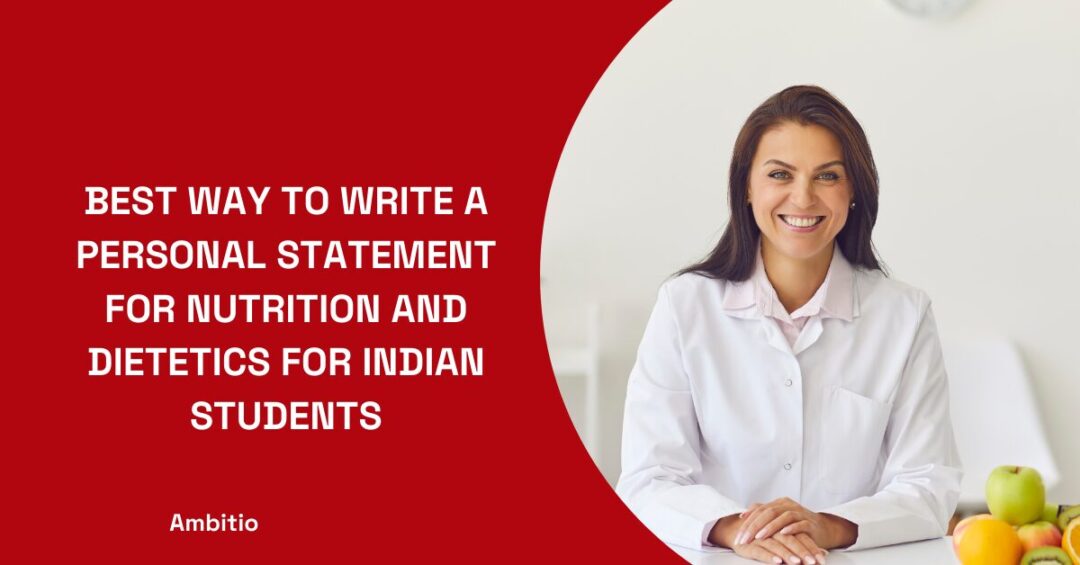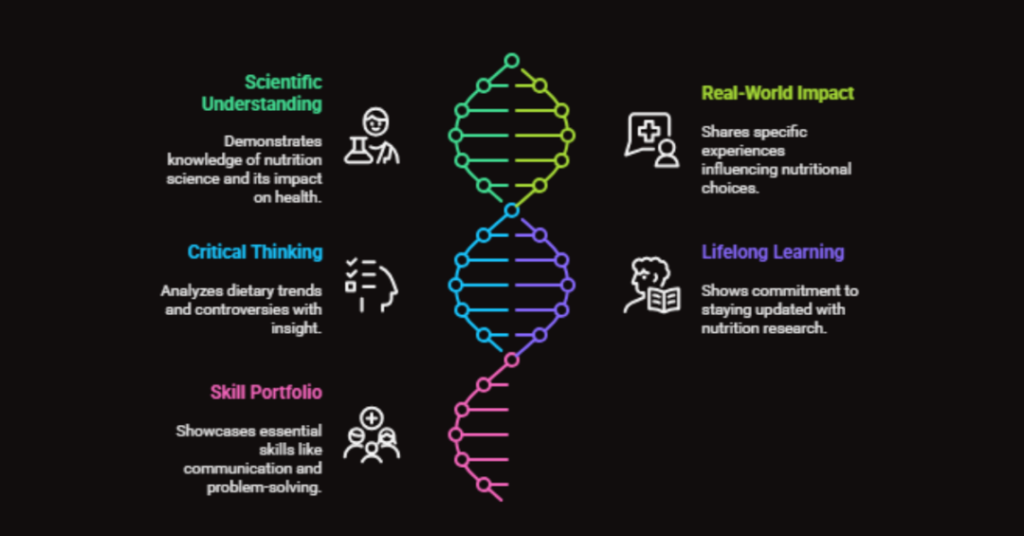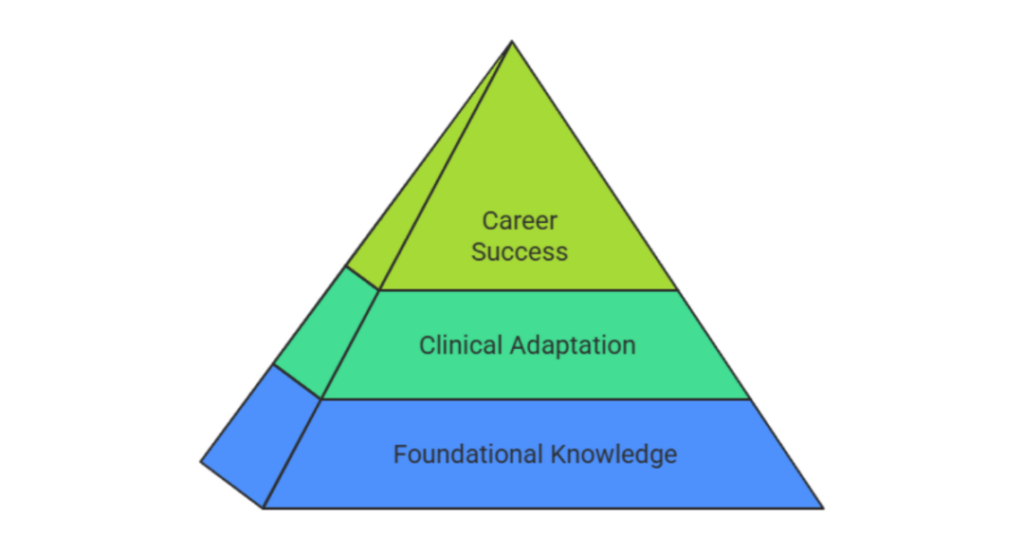22 May 2025
5 minutes read
Best Way To Write A Personal Statement For Nutrition And Dietetics For Indian Students

Key Takeaways
- Craft a personal statement for nutrition and dietetics that tells your unique story with real examples and scientific insight.
- Prepare a full set of documents including transcripts, CV, and references to prove your readiness for a master’s program.
- Choose your undergraduate university wisely as it shapes your skills, experience, and future salary potential in dietetics.
Nearly 70% of applicants to dietetics programs get rejected, not because they lack passion, but because their personal statements sound like a broken record—empty, generic, and forgettable. Let’s be real: writing a personal statement that actually stands out is brutal, especially when everyone’s throwing in the same buzzwords about “healthy lifestyle” and “caring for others.”
The truth? To nail your dietetics personal statement, you need to cut through the noise with real stories about your experience, your chemistry with nutrition, and why you’re the candidate who won’t just talk diet but will change lives—starting with your own.

Here’s what you actually need to do:
1. Show Your Understanding of Dietetics Beyond “Healthy Eating”
Most applicants repeat basic ideas like “promoting a healthy lifestyle” without demonstrating a deep grasp of dietetics. Highlight your awareness of the science behind nutrition—how chemistry affects metabolism or how dietary choices impact obesity and chronic disease. This proves you’re ready for the technical demands of the university course and the career ahead.
2. Connect Your Personal Experiences to Real-World Impact, Not Just Feel-Good Stories
Don’t settle for vague volunteer work or generic “caring” statements. Share specific moments where your actions influenced someone’s nutritional choices or lifestyle, even if it was a small win. Concrete examples show you understand the real-world challenges dietitians face daily and your role in solving them.
3. Demonstrate Critical Thinking About Dietary Trends and Controversies
Show you’re not just a follower of fad diets or popular nutrition advice. Reflect on your perspective regarding common dietary controversies—like keto, intermittent fasting, or supplements. This reveals your ability to analyze information critically, a key skill for any dietitian navigating conflicting nutritional science.
4. Illustrate Your Commitment to Lifelong Learning and Adaptability
The field of nutrition evolves constantly. Don’t just say you’re passionate—show how you keep updated with the latest research, courses, or chemistry breakthroughs. Highlight your willingness to adapt your approach, proving you’re prepared for the dynamic nature of the dietitian career.
5. Use Your Personal Statement as a Mini Portfolio of Skills, Not Just a Story
Think beyond storytelling. Your statement should subtly showcase skills essential for dietitians—communication, problem-solving, empathy, and scientific reasoning. Make every sentence work double duty: tell your story and demonstrate the qualities that make you a strong candidate.
What Are The Other Documents Required For Masters In Nutrition And Dietetics?
Okay, tell me, do you think submitting just a personal statement will get you into a master’s in nutrition and dietetics? Nope. Universities want proof you’ve got the biology, food science, and time management skills to tackle poor nutrition, diabetes, and real-world health problems.
If you want to educate people and make a positive effect, you need more than passion—you need the right documents showing you’re ready for this IFST-accredited course and clinical life.
| Required Document | Why It Matters | Tips to Nail It |
|---|---|---|
| Undergraduate Transcript | Shows your academic foundation in biology, food science, and dietetics from your undergraduate uni’s. | Highlight relevant modules, especially those about human body, genetics, and diet and exercise. |
| Curriculum Vitae (CV) | Demonstrates your experience, internships, and clinical assistant roles that prove your readiness. | Include your role in a health service, volunteer work, and any time management skills you gained. |
| Personal Statement (4000 characters max) | Your chance to express your passion for helping others and knowledge about dietetics. | Focus on how you want to educate people and create a positive effect on their lifestyle choices. |
| References (Academic & Professional) | A Letter of recommendation validates your academic abilities and professional behaviour in clinical or community nutrition settings. | Choose supervisors or lecturers who can speak to your empathy, communication skills, and reliability. |
| Proof of Internship/Work Experience | Confirms hands-on experience in diet and food preparation, essential for understanding real-world challenges. | Include details from clinical settings or NHS placements that reflect your role in patient care. |
| UCAS Application Form | The formal application platform that ties your entire profile together. | Double-check every section for completeness; ensure all qualifications and experience are listed. |
| English Language Qualification (if applicable) | Required if your degree was not in English, ensuring you can communicate effectively in seminars and clinics. | Submit IELTS or TOEFL scores that meet university thresholds. |
| IFST Accredited Course Certificate (if any) | Shows you have completed courses meeting industry standards in food science and nutrition. | If applicable, highlight this to boost your credibility. |
10 Top Undergraduate Universities For Masters In Nutrition And Dietetics
You’re entering a profession where science meets service, and where you’ll be expected to understand genetics, food preparation, clinical settings, and human behaviour better than most of your patients. So yeah—where you study matters. Big time. The right undergraduate university can shape your day-to-day knowledge of food, help you adapt in clinical settings, and even determine how nutritionally rewarding (financially, too) your future as a registered dietitian will be.

Here’s the real breakdown—no fluff.
| University | Average Tuition Fees (Per Year) | Average Graduate Salary |
|---|---|---|
| University of California, Berkeley | $32,000 – $42,000 | $70,000 – $85,000 |
| Columbia University | $50,000 – $60,000 | $75,000 – $90,000 |
| New York University | $40,000 – $50,000 | $70,000 – $85,000 |
| Boston University | $50,000 – $55,000 | $70,000 – $85,000 |
| University of Texas at Austin | $20,000 – $30,000 | $65,000 – $80,000 |
| University of Washington | $35,000 – $45,000 | $70,000 – $85,000 |
| University of North Carolina at Chapel Hill | $25,000 – $35,000 | $65,000 – $80,000 |
| University of Illinois at Urbana-Champaign | $30,000 – $40,000 | $65,000 – $80,000 |
| University of Michigan | $45,000 – $55,000 | $70,000 – $85,000 |
| Ohio State University | $25,000 – $35,000 | $65,000 – $80,000 |
Best Nutrition And Dietetics Personal Statement Example
A well-crafted example shows you how to structure your story, highlight your unique experiences, and speak directly to what admissions tutors really want. It’s not about copying—it’s about learning how to make your own passion and qualifications shine in a clear, professional way.
From a young age, I was fascinated by the connection between food and the human body. My undergraduate studies in biology and food science gave me a solid understanding of how diet influences health, especially when I saw family members struggle with diabetes and other health problems. This sparked my passion for nutrition and dietetics as a way to make a real difference.
During my internship at a local clinic, I gained hands-on experience in community nutrition. I observed how poor nutrition and lifestyle choices directly affect people’s day-to-day well-being. This experience taught me the importance of combining empathy with scientific knowledge to educate and support patients effectively.
I am now eager to pursue a master’s degree in nutrition and dietetics, ideally an IFST accredited course, to deepen my knowledge of diet, genetics, and human biology. I also want to strengthen my communication skills and time management, essential for working as part of a healthcare team and helping people adapt healthier behaviours.
Being part of a profession that has a positive effect on individuals’ quality of life motivates me every day. I’m committed to using my education and experience to support patients and communities, contributing to the fight against malnutrition and chronic illnesses as a registered dietitian.
Conclusion
The right documents, the right university, and the right attitude matter just as much as your passion. If you can prove you understand the science, have real experience, and are ready to keep learning, you’re already ahead of most applicants. This field is tough but rewarding, and the personal statement is your first chance to show you’re serious about making a difference—not just for yourself, but for every person you’ll help live healthier lives.
Most applicants struggle to write a perfect personal statement but end up sounding arrogant — but you won’t. At Ambitio, our AI-powered study abroad experts help you craft a powerful, standout statement that gets noticed. No fluff, no clichés—just a compelling story that proves you belong. Schedule a call with Ambitio’s experts.
FAQs
What career opportunities does a Master’s in Nutrition and Dietetics abroad offer?
Graduates can work as clinical dietitians, nutrition consultants, public health nutritionists, researchers, community wellness coordinators, and more
Where can I work after completing this degree abroad?
You can work in hospitals, outpatient clinics, research institutions, government agencies, private practices, and corporate wellness programs
Is there a demand for nutrition and dietetics professionals globally?
Yes, the field is growing due to increased awareness of health and chronic diseases, with strong job growth projected in many countries
Can I become a registered dietitian after studying abroad?
Yes, if the program meets the requirements for registration in your target country (e.g., HCPC in the UK, Commission on Dietetic Registration in the US)
Are there opportunities for research in this field?
Yes, many programs include research projects, and graduates can pursue roles in academic research or public health research
Can I study online and still have good career prospects?
Yes, many universities offer online Master’s programs in Nutrition and Dietetics, which are recognized by employers if accredited

You can study at top universities worldwide!
Get expert tips and tricks to get into top universities with a free expert session.
Book Your Free 30-Minute Session Now! Book a call now




























